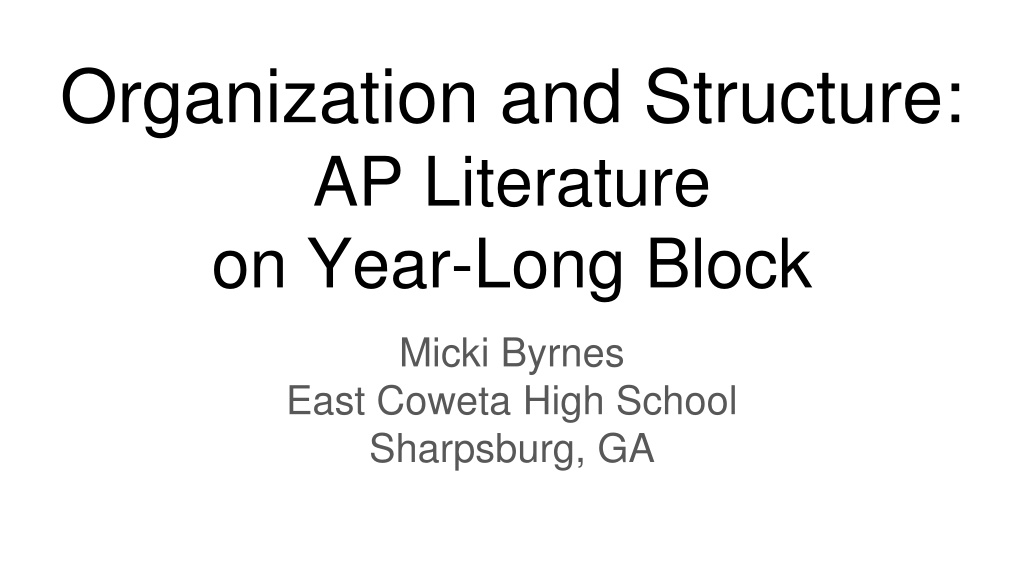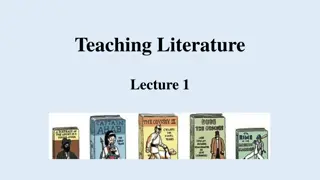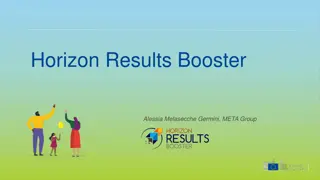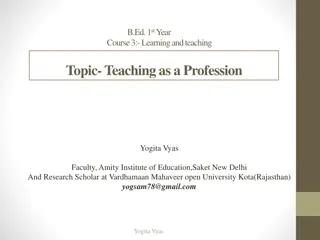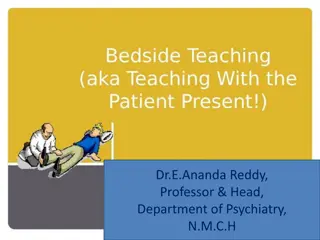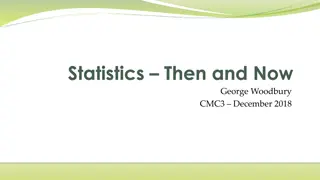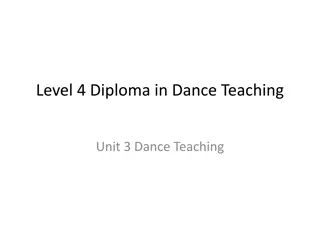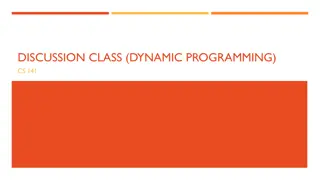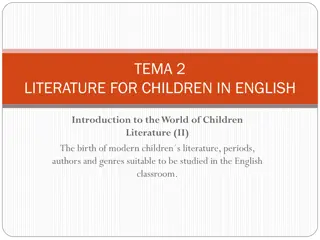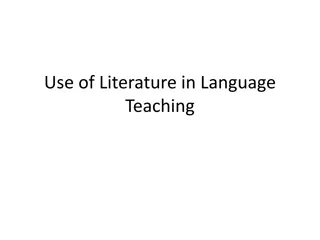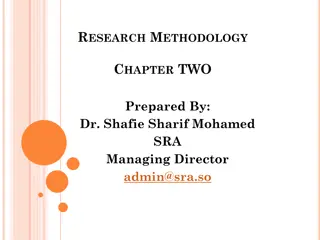Maximizing Teaching Time in AP Literature: Strategies and Benefits
Our AP Literature class follows a year-long block schedule, providing 16,200 minutes of valuable class time. By structuring our curriculum chronologically, we explore various genres and examine the evolution of literature and philosophies over time. Incorporating historical background enhances students' critical reading and writing skills, preparing them for the exam and beyond.
Download Presentation

Please find below an Image/Link to download the presentation.
The content on the website is provided AS IS for your information and personal use only. It may not be sold, licensed, or shared on other websites without obtaining consent from the author. Download presentation by click this link. If you encounter any issues during the download, it is possible that the publisher has removed the file from their server.
E N D
Presentation Transcript
Organization and Structure: AP Literature on Year-Long Block Micki Byrnes East Coweta High School Sharpsburg, GA
What do you do with all that time??? Our AP Literature class is on year-long block schedule 90 minutes x 180 days = . I don t math. Actually, 16,200 minutes of class time (give or take pep rallies, fire drills, testing periods, snow days, etc.) Our AP Literature class is actually a combination of two classes: Adv. 12th British Literature and AP Literature, so we have to follow BOTH GSE standards AND College Board requirements.
What do you do with all that time??? Many teachers take a thematic or genre approach, but with all that time on our hands, we go chronologically.Benefits of chronological structure: Opportunity for genre variety within unit Ability to see how philosophies and literature change through time Most college survey classes follow chronological approach
Benefits of a Timeline/Historical Background Understanding of literary history and generic range cannot be directly examined given the enormous variations in AP classrooms, but these considerations and more will have shaped the nuanced text-reading abilities, and the clear critical writing, of a student who is well prepared for the exam and beyond. Heather Murray, Associate Professor of English, University of Toronto - AP Literature Teacher s Guide (2007).
But theyre only tested on 16th century and later... But can you understand Shakespeare s Troilus and Cressida if you haven t read the Iliad? Will you appreciate Milton s Paradise Lost if you aren t familiar with the myths from Ovid s Metamorphoses? Most importantly, if you don t read works from before the 16th century, how will you know that The Tale of the Three Brothers from Harry Potter is based on The Pardoner s Tale from The Canterbury Tales?????
My Scope and Sequence Weeks 1-3: Foundations of Western Literature Before we can delve into the classic works of William Shakespeare, John Milton, or understand modern works like Eliot s The Wasteland, we must first give ourselves a firm grounding in the ancient texts that inspired these artists. We will discuss the epic poem The Iliad (your summer reading assignment), read Sophocles Oedipus Rex, and provide ourselves with a working understanding of some of the most common biblical and mythological allusions that you ll encounter in your reading. EQ What is a man beast, god, or a little of both? RESEARCH: Students will research and present common literary allusions to the class. WRITING: We will focus on how to analyze an AP essay prompt, as well as on how to form theme statements. Students will also analyze modern works of literature that pull from ancient texts (i.e. Margaret Atwood s Siren Song, W. H. Auden s The Shield of Achilles, and Tennyson s Ulysses.
My Scope and Sequence Weeks 4-6: Anglo-Saxon Literature During this unit, we will study the oldest examples of English literature and learn how the English language as changed and evolved across the centuries. We will focus on such works as Beowulf, and excerpts from The Ecclesiastical History of the English People and The Exeter Book. We will also do a film study on The 13thWarrior as we discuss why modern audiences still find ancient texts relevant and important. EQ What does it mean to be a hero? RESEARCH: Students will begin selecting books for their senior paper. WRITING: Students will discuss how modern adaptations of ancient texts reveal how our cultural values have changed over the centuries. Students will also begin to work on the open-ended question prompts that apply to works we ve studied so far (Iliad, Oedipus Rex, and Beowulf).
My Scope and Sequence Weeks 7-9: Medieval Literature In our unit on medieval literature, we will look at Chaucer s Canterbury Tales, Arthurian legends such as Sir Gawain and the Green Knight, the morality play Everyman, the works of the early church, and medieval ballads. We will focus specifically on characterization and tone during this unit as we continue to investigate the growth of the English language. EQ Where do we find our moral compass? RESEARCH: Students will read their senior paper novels and will have an opportunity to use primary source texts to help provide context for understanding older works. WRITING: Students will use the General Prologue to The Canterbury Tales to help identify Chaucer s complex attitude towards the clergy, supplementing with primary source texts from St. Augustine, St. Francis, and St. Benedict. Students will also have the opportunity to write their own scene from a morality play entitled Everystudent.
My Scope and Sequence Weeks 10-12: Renaissance Literature Our primary focus in this unit will be Marlowe s The Tragical History of Doctor Faustus. We will also do a film study of Branagh s Hamlet. We will look at the different types of sonnets and discuss poetic meter, as well as study historical documents and portraits from Queen Elizabeth I. The English language is considered modern at this point, but students still struggle with comprehension of these older works, so we will focus on close reading strategies to improve comprehension. EQ When does knowledge and wit help us? When does it get us into trouble? RESEARCH: Students will choose a research topic and find appropriate sources of research. WRITING: We will begin to look at and practice AP essay prompts that deal with 16thcentury poetry the sonnet especially (George Gascoigne s Because He Looked Not Upon Her, etc.) Students will have the opportunity to write their own sonnet.
My Scope and Sequence Weeks 13-15: Early 17thCentury Literature This unit focuses on two major texts: Shakespeare s Macbeth and large excerpts from Milton s Paradise Lost. In meeting Milton s version of Satan, we will see the beginnings of a character type that will take us through the modern era. We will look at the influence of King James I on the literature of the time, as well as study the metaphysical, cavalier, and puritan poets (including Anne Bradstreet from America). EQ Why do people risk everything for power? RESEARCH: Students will draft, edit, and turn in their research papers. WRITING: Students will work to paraphrase some of the more complicated sections of Macbeth and Paradise Lost into everyday language. We ll look at AP prompts covering the metaphysical poets like Donne, Marvell, and Herbert. Students will finish their research papers and turn those in.
My Scope and Sequence Weeks 16-18: The Enlightenment/Age of Reason Satire is the focus of this unit of study. Students will investigate the social uses of satire and the techniques writers use to achieve a satirical tone and purpose. We ll look at Austen s Sense and Sensibility, excerpts from Gulliver s Travels, various satirical essays, and modern examples of satire. We ll also focus on historical records of the bubonic plague as documented in England during the 1600s. It s at this point that we ll also start to incorporate more American authors--Franklin, Paine, etc. EQ Why is satire so persuasive? RESEARCH: Students will receive feedback on their research projects. WRITING Students will craft modern-day satires based on current events. Students will also practice AP-style essay prompts with satirical tones, such as Addison s Gentleman s Diary from The Spectator or excerpts from Fielding s Tom Jones.
My Scope and Sequence Weeks 19-21: Romanticism In this unit, we will complete our novel study on Mary Shelley s Frankenstein. This novel will provide a means of looking back at the previous time periods and seeing how culture has changed, as well as providing a springboard for discussions on how science has impacted (and is still impacting) our society. We will follow up with the works of the Romantic poets: Blake, Wordsworth, Coleridge, Shelley, Byron, and Keats. We will also touch briefly to recap the Transcendentalist movement in the U.S. We ll do a great comparison of Frankenstein and Hawthorne s The Birthmark. EQ What dreams and nightmares are possible in the human imagination? RESEARCH: Students will be introduced to their Museum of Literature project (which will be due in Week 27). Students will do a group-based book study on either Tess of the d Urbervilles or The House of Mirth) in order to create a large museum exhibit of their novel. WRITING: Students will be given further opportunities to practice AP-style poetry prompts, as well as further instruction on the Open-Ended question using Frankenstein.
My Scope and Sequence Weeks 22-25: The Victorian and Edwardian Age Our main focus for this unit will be a film study of Bront s Wuthering Heights and a reading of George Bernard Shaw s Pygmalion two works in which we will study how expectations regarding social class affect character outcomes. We will also look at short excerpts from Charles Dickens, as well as the poetry of Tennyson, Arnold, Hardy, Browning, Kipling, and Hopkins. We will finish the unit with a comparison of Joseph Conrad s Heart of Darkness and Francis Ford Coppola s Apocalypse Now. EQ How do we react in the face of others expectations of us? RESEARCH: Students will continue working on their museum projects outside of class. A guest speaker who served in the Vietnam War will come to discuss Heart of Darkness and Apocalypse Now. WRITING: Students will write an out-of-class essay comparing themes in Heart of Darkness and Apocalypse Now.
My Scope and Sequence Weeks 26-27: The Modern Age During this unit, students will finalize and present their museum projects. We will look at Franz Kafka s The Metamorphosis and discuss the effects modern society and warfare has on the psyche and consciousness. We will touch on American authors like Ernest Hemingway and F. Scott Fitzgerald. We will read poetry from T.S. Eliot, William Butler Yeats, Robert Frost, W.H. Auden, H.D., Amy Lowell, and Ezra Pound. EQ How does change affect us? How do we adapt? RESEARCH: Students will use the essays of T.S. Eliot, Virginia Woolf, and Robert Frost to develop an understanding about how Modern artists viewed their craft. WRITING: Students will continue to practice sample AP Exam writing prompts, with a focus on prose.
My Scope and Sequence Weeks 28-29: The Harlem Renaissance We will spend two weeks looking at the artists associated with the Harlem Renaissance, such as Claude McKay, Countee Cullen, and Langston Hughes. Our main text from this unit will be Zora Neale Hurston s Their Eyes Were Watching God. EQ How do we define identity? What is it made up of? RESEARCH: We will use primary source documents like The Atlanta Compromise, The Souls of Black Folk, and The Autobiography of Marcus Garvey to understand the different philosophies surrounding the Harlem Renaissance. WRITING: Students will continue to practice sample AP exam essay prompts.
My Scope and Sequence Weeks 30-34: Postmodernism and the AP Exam As we draw closer to the AP Exam, we will turn our focus to the postmodern period. Our major texts of study will be Waiting for Godot and Invisible Man. We will also look at sub-genres like the Beat and Confessional poets, as well as the Southern Gothic. We will try to fit in as many contemporary poets as we can, too especially living poets like Natasha Trethaway, Yusef Komunyakaa, and Derek Walcott. EQ Who or what can we rely on when everything around us seems to be going to pieces? RESEARCH: Students will be preparing for the AP exam. WRITING: Students will continue to work on all AP exam questions types.
My Scope and Sequence Weeks 35-36: Post-Colonialism and Final Projects Our final unit of study focuses on the concept of the post-colonial. We will conduct a film study of Steven Spielberg s Empire of the Sun, which looks like British-occupied China during the outbreak WWII. Also during this time, students will be working on their final projects: A Tableau Vivant digital photograph of a scene from their favorite work of the year, as well as a presentation on the progression of a particular concept or symbol throughout literary history. EQ How do we recognize ourselves when everything that defined us is gone or changed? RESEARCH: On-going final project (see above) WRITING: On-going final project (see above)
Other Scope & Sequences Find samples at http://apcentral.collegeboard.com/apc/members/repository/ap 07_englit_teachersguide.pdf
Okay what do you do with 90 minutes??? 5 minutes: Admin, attendance, reminders 5-10 minutes: Warm Up (LOVE Nancy Dean s Voice Lessons) 10 minutes: Reading Quiz over last night s reading homework 20-30 minutes: Discussion of last night s reading 30-40 minutes: Activity of the day 5 minutes: Closure, reminders, recap
